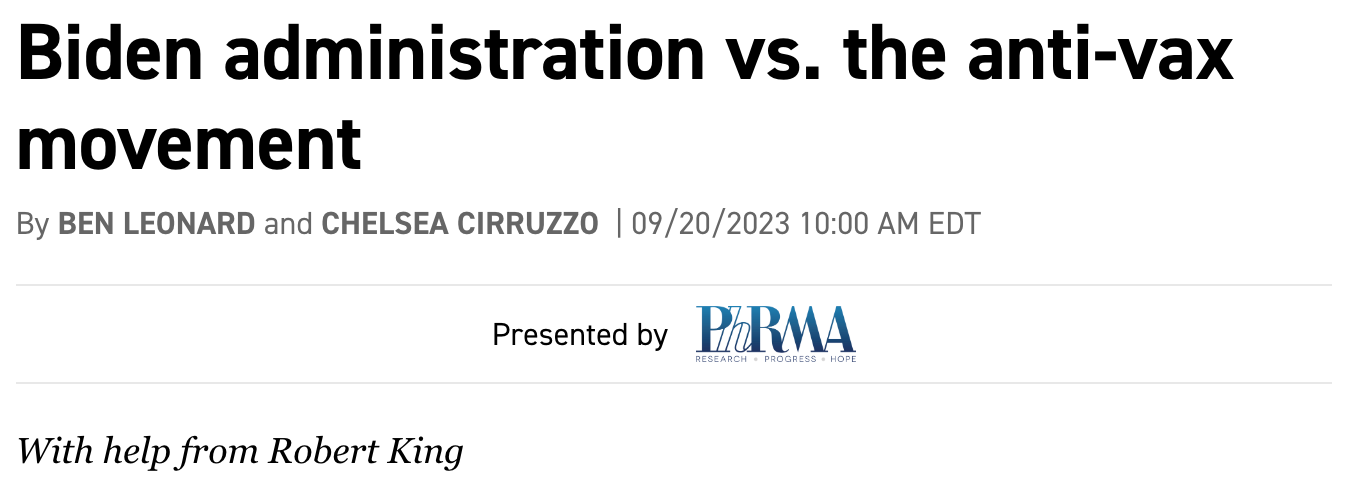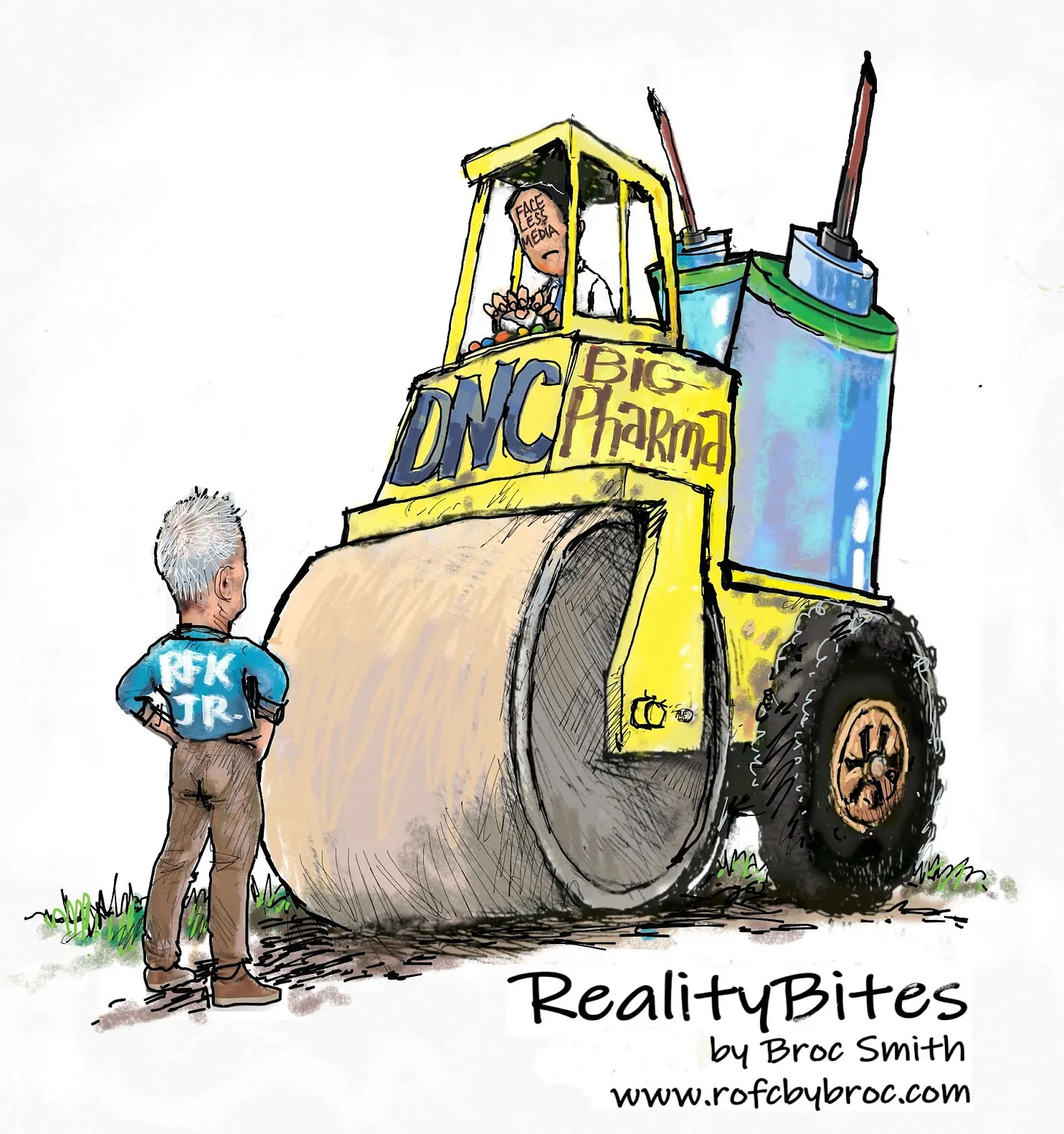Originally published by The Kennedy Beacon on Substack
On September 20, Politico published an article titled Biden administration vs. the anti-vax movement. As highlighted in our news roundup, the piece presents a favorable view of the administration’s efforts to address “misinformation” about COVID-19 vaccines by coordinating with social media companies to “crack down on anti-vaccine posts.” Ultimately, the article morphs into an advertisement for the administration’s renewed push for Americans to roll up their sleeves and receive the next booster shot.
Despite using the name and face of Robert F. Kennedy Jr. in the introduction, the article does not invoke any examples of alleged “misinformation” on the part of the presidential candidate. Initially presenting itself as political commentary by reporters Ben Leonard and Chelsea Cirruzzo, it is actually an example of sponsored content—in other words, a paid advertisement masquerading as news.
Unlike the popular “Brought to you by Pfizer” meme, featuring a highlight reel of major news programs celebrating COVID-19 vaccine developer Pfizer as their sponsor, a sponsored article like this can easily fly under the radar. This Politico piece kills two birds with one stone: it promotes a pharmaceutical product directly to consumers, and defames Kennedy as an “anti-vaccine” activist.

In this case, Politico is brought to you by Pharmaceutical Research and Manufacturers of America, or PhRMA for short.
This pharmaceutical industry association was founded in 1958 to lobby the US government for “alignment between public policy and medical research to address patient needs.” It is based in Washington, DC, with offices across California, Colorado, Georgia, Indiana, Louisiana, Massachusetts, Minnesota, New York, and Washington State. While ostensibly representing American pharmaceutical interests, PhRMA also has international headquarters in Beijing, Dubai, and Tokyo.
Through its stated objective of working to “encourage the discovery of new medicines,” PhRMA redirects public funding toward its membership consisting of 34 major pharmaceutical companies. Among these corporate members are COVID-19 vaccine developers GlaxoSmithKline, Johnson & Johnson, Novartis, Pfizer, and Sanofi; Gilead Sciences, responsible for the highly toxic remdesivir; and multiple companies that have profited greatly over the past few years from monoclonal antibodies and other experimental COVID-19 therapeutics, including Amgen, Bayer, Eli Lilly, Genentech, Merck, and Takeda. AstraZeneca was also a member until just recently.
PhRMA’s website highlights the organization’s impact on the public health response to COVID-19 by directly “collaborating with U.S. and global health authorities.” Its efforts were bolstered through a partnership with the Biotechnology Innovation Organization (BIO), an even larger lobbying organization with which PhRMA shares members. On March 17, 2020, PhRMA and BIO published an “industry principles” document highlighting plans to coordinate closely with government agencies, and to provide generous “financial support” that will allow the organizations to capitalize on their “decades-long investments” in novel technologies for use in medical countermeasures such as vaccines.
It is those very vaccines that Politico’s article/advertisement serves to defend and promote. That requires defending the Biden administration, which has resorted to censorship and highly targeted lawfare in an effort to maximize vaccine uptake. This is particularly problematic given Politico’s declared journalistic interest in corporate lobbying, which the outlet’s Mission Statement describes as “dimly understood and insufficiently covered” in the context of American politics.
OpenSecrets reveals that PhRMA spent a whopping $29,236,000 on its lobbying activities in 2022, with campaigns targeting the Food and Drug Administration (FDA), the Centers for Medicare and Medicaid Services, the Department of Health and Human Services, the Department of State, the Department of Homeland Security, the White House, and even Biden’s executive office. Its 2023 expenditures aren’t far behind, coming in at $14,498,000 so far.
The firms PhRMA hired to lobby on its behalf are deeply rooted in both the pharmaceutical industry and the Democratic establishment that controls the White House and the party.
Covington & Burling (C&B), the highest-paid firm on PhRMA’s 2022 payroll, is a member organization of both the Council on Foreign Relations and the World Economic Forum, two of the most influential unelected bodies on the planet, whose memberships include Johnson & Johnson, Pfizer, and several other major pharmaceutical companies. Peter Hutt, senior counsel at C&B’s Washington office, previously served as chief counsel at the FDA and was responsible for writing updated “procedural regulations that govern all FDA administrative action to this day.” He also served on the board of directors for Moderna until 2019, at which point he continued working with the mRNA vaccine developer as an advisor, according to a SEC filing. Hutt’s professional path epitomizes the “revolving door” that defines America’s regulatory-industrial complex.
Another firm lobbying on behalf of PhRMA is Ricchetti Incorporated, cofounded by brothers Jeff and Steve Ricchetti. In a 2012 piece in the Washington Times, Timothy Carney described Steve Ricchetti as a “revolving-door lobbyist” whose long-term relationship with then vice president Joe Biden posed serious ethical concerns. True to form, Ricchetti is currently serving as a senior advisor to President Biden, while his brother continues to lobby on behalf of PhRMA and other corporate clients, such as Amazon.
These are just a few examples highlighting the deep hold the pharmaceutical lobby has on Washington, DC, assisted by former government officials and people with conflicts of interest. That lobby has been a deep-rooted and well-recognized problem for decades, reaching all-time highs in 2022, according to OpenSecrets.
However, just as everyday citizens are becoming increasingly aware of the activities of “crony capitalist” organizations like BlackRock (as reported by The Kennedy Beacon) and the World Economic Forum, so, too, are PhRMA’s campaigns coming under elevated scrutiny by the public and (some of) their representatives. Late last year, STAT News reported that PhRMA’s historically effective “scorched-earth tactics” had lost their edge, suggesting the organization may be on the retreat. This is further exemplified by the fact that a number of companies have recently chosen to jump ship, including COVID-19 vaccine developer AstraZeneca, as also reported by STAT News.
Even the largest media outlets and industry associations are sensitive to public scrutiny—aware of the power of an increasingly alert American consumer.

